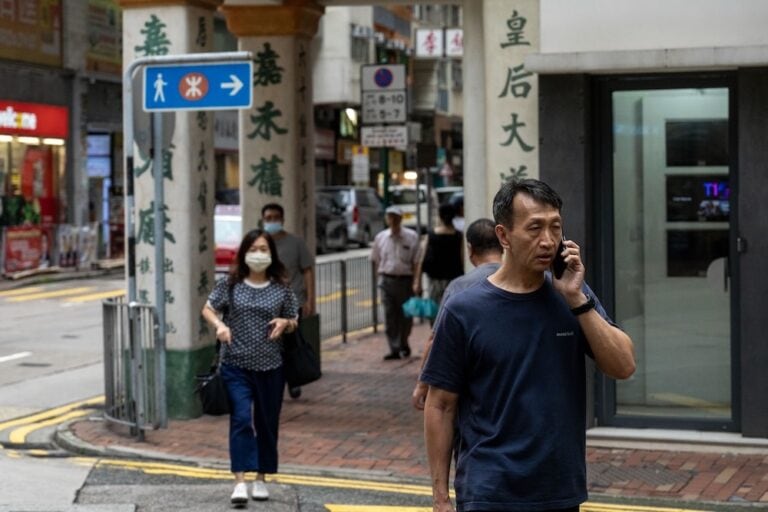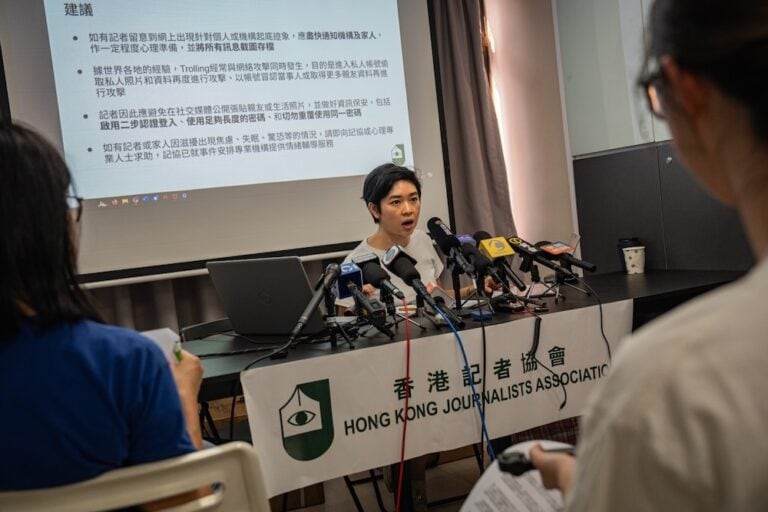The IFJ is concerned by the continuing decline of political impartiality through editorial compromise in Hong Kong's largest free-to-air television network, Broadcasting Television of Hong Kong (TVB).
This statement was originally published on ifj.org on 4 March 2015.
The International Federation of Journalists (IFJ) is concerned by the continuing decline of political impartiality through editorial compromise in Hong Kong’s largest free-to-air television network, Broadcasting Television of Hong Kong (TVB).
According to a report in a Hong Kong newspaper on March 2, TVB has recruited a former Democratic Alliance for the Betterment of Progress of Hong Kong (DAB) secretary, as a managing editor. It is said the new recruit will focus on editing the paper’s political news. Due to the sensitive nature of the information, the IFJ has chosen not able to reveal the name of the person.
It is understood the former DAB secretary was employed for a decade by DAB, , which is the largest and oldest pro-Beijing political party in Hong Kong. He also previously worked for WenWei Pao, the Central Government controlled newspaper in Hong Kong, TVBS (Television Broadcasting Statelite, Taiwan) and TVB in Taiwan.
Kenneth Yuen, head of the TVB news department has denied any political influence in the appointment. However his recruitment has received internal and external criticism. A number of TVB employees are deeply worried that the current political inclination towards the establishment will further worsen the political independence of the news service.
Since Chinese Lunar New Year in February, several veteran journalists have tendered their resignation including Lam Tsz-Ho, Tiffany Lau, Tsz-Yan, Stella Lam Chiu-Yee, Maggie Tam Mei-Kei, Julia Chiu Pui-Yu, Ho Wing-Hong and Peri Chow. Many of them have been working for TVB for almost 20 years.
TVB journalists who wished to remain anonymous told IFJ that the morale in the news department was very low. Mid-level management has repeatedly told staff that if they are unhappy they can leave.
A number of journalists were forbidden from covering political news during the Occupy Movement last year because they were ‘unreliable’. While journalists who were covering the protests were told by management not to criticise the police because “police are the weakest sector in the society and that the press has a duty to protect them”.
A second journalist told the IFJ that: “Some of the journalists asked our senior manager for the reason as to why so many journalists were forbidden from covering the protests or political news. However no reason was provided. We do not share the same views as management. Those labelled as ‘unreliable’ political journalists are experienced and outspoken. Many demanded to continuing covering the stories and offered to help other staff write their stories in front of management but it was in vain.”
Another journalist told the IFJ that management had been “eager to assign relatively inexperienced journalists to cover political news instead of assigning veteran journalists”.
On October 15, 2014, journalists exclusively recorded several police officers moving an Occupy Movement protester to a dark cover and beating him up for four minutes. However the report was changed and the voice-over was deleted after senior management made the call to the editorial department. It then sparked an outcry both internally and externally. Dozens of TVB journalists initiated an open letter to protest the changes. Three journalists were punished for their actions. Two of the journalist who have since resigned from TVB were demoted including, Ho Wing-Hong who was demoted to senior researcher and Peri Chow who was demoted and assigned to provide news to overseas media.
One journalist said: “Journalists were alarmed and felt deeply disappointed after the incident in October last year. Although many journalists signed a joint letter to express their disappointment with the head of the news department and action was taken, it did not improve the situation. Every day we have to find different methods to carry news that the public should know about.”
The IFJ Asia Pacific Office said: “It is highly questionable that TVB would employ a member of a political party to head the political news desk. The IFJ is greatly concerned at the decline in standards at TVB since last year and we call into question their current independence and impartiality based on the series of incidents we have observed at the broadcaster.”
The IFJ urge the Office of Communication Authority to look into the numerous incidents at TVB as well as the governing principles and rules of the organization.
We also call on the TVB management board to outline the decision made to hire the political party cadre and the protocols that will be followed to ensure neutrality and impartiality.


